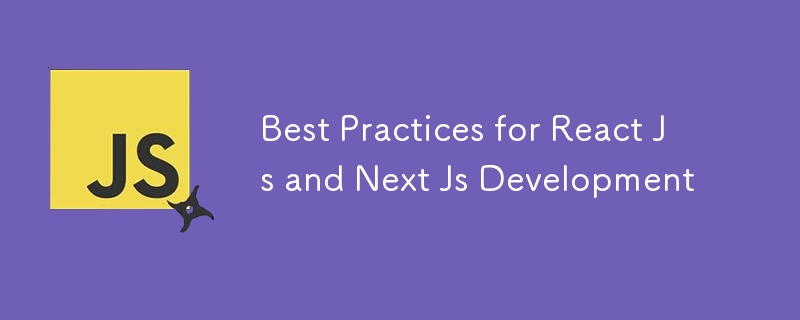Home >Web Front-end >JS Tutorial >Best Practices for React Js and Next Js Development
Best Practices for React Js and Next Js Development
- Linda HamiltonOriginal
- 2024-09-25 14:23:02841browse

Hey, developers! ? As we explore the exciting realm of web development, following best practices can truly elevate our projects. Here are some essential tips to enhance your work with React.js and Next.js:
1. Component Structure
- Keep Components Small: Aim for single-responsibility components to improve readability and maintainability.
- Use Functional Components: Favor functional components with hooks for cleaner syntax and easier state management.
2. State Management
- Lift State Up: Manage state at the highest necessary level to share it seamlessly among components.
- Use Context API: Leverage the Context API for global state management and avoid prop drilling.
3. Performance Optimization
- Memoization: Utilize React.memo() and useMemo() to prevent unnecessary re-renders, ensuring a snappy user experience.
- Lazy Loading: Implement dynamic imports in Next.js to split code and load components only when needed.
4. Routing Best Practices
- File-based Routing: Take advantage of Next.js’s intuitive file-based routing for a clean and organized structure.
- Dynamic Routes: Use dynamic routing for pages requiring parameterized paths.
5. API Calls and Data Fetching
- Use getStaticProps and getServerSideProps: Optimize SEO and performance by utilizing these data-fetching methods.
- Error Handling: Implement robust error handling to maintain a smooth user experience.
6. Styling Approaches
- CSS Modules: Use CSS Modules for scoped styling, preventing clashes in styles across components.
- Styled Components: Consider styled-components for dynamic styling and theming.
7. Testing and Quality Assurance
- Unit Testing: Write comprehensive tests using Jest and React Testing Library for your components.
- End-to-End Testing: Implement tools like Cypress or Playwright for testing user interactions across your application.
8. Version Control and Collaboration
- Use Git Effectively: Maintain a clear branching strategy and commit messages to enhance collaboration.
- Code Reviews: Regularly conduct code reviews to share knowledge and improve code quality.
By following these best practices, you’ll build robust, efficient, and scalable applications with React.js and Next.js. Let’s keep learning and supporting each other on this journey! ?❤️
Feel free to share your thoughts or additional tips in the comments below! What best practices have you found most helpful?
The above is the detailed content of Best Practices for React Js and Next Js Development. For more information, please follow other related articles on the PHP Chinese website!
Related articles
See more- An in-depth analysis of the Bootstrap list group component
- Detailed explanation of JavaScript function currying
- Complete example of JS password generation and strength detection (with demo source code download)
- Angularjs integrates WeChat UI (weui)
- How to quickly switch between Traditional Chinese and Simplified Chinese with JavaScript and the trick for websites to support switching between Simplified and Traditional Chinese_javascript skills

